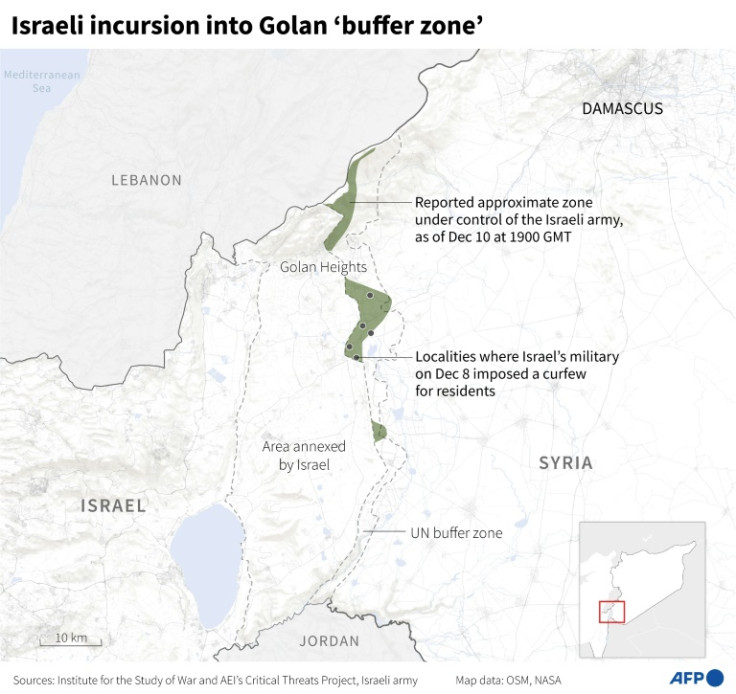Israel Orders Troops To 'Prepare To Remain' In Syria Buffer Zone Through Winter

Israeli Defence Minister Israel Katz has ordered the military to "prepare to remain" throughout the winter in the UN-patrolled buffer zone that is supposed to separate Israeli and Syrian forces on the Golan Heights.
Israel seized the demilitarised zone on the strategic plateau on Sunday, just hours after Syrian rebels swept president Bashar al-Assad from power.
Since then, the Israeli military has launched hundreds of air and naval strikes against Syrian military assets, targeting everything from chemical weapons stores to air defences to prevent them from falling into rebel hands.
The plan to deploy troops in the buffer zone comes at a time when Israeli forces are still withdrawing from southern Lebanon after fighting Hezbollah militants for months and the war in Gaza with Palestinian militants continues.
"Due to the situation in Syria, it is of critical security importance to maintain our presence at the summit of Mount Hermon, and everything must be done to ensure the (army's) readiness on-site to enable the fighters to stay there despite the challenging weather conditions," Katz's spokesman said in a statement on Friday.
Mount Hermon is Syria's highest peak and has long boasted a UN observation post at the summit.
Israel has said it seized the buffer zone to defend itself.
Prime Minister Benjamin Netanyahu's office said on Thursday that the collapse of Assad's rule had created a "vacuum on Israel's border and in the buffer zone".
"This deployment is temporary until a force that is committed to the 1974 (armistice) agreement can be established and security on our border can be guaranteed."
Israel captured most of the Golan Heights from Syria during the 1967 Arab-Israeli war.
It held onto the territory during the 1973 Arab-Israeli war and in 1981 annexed the area in a move since recognised only by the United States.
Israel's seizure of the buffer zone has triggered widespread international criticism, including from UN chief Antonio Guterres.
Guterres "is deeply concerned by the recent and extensive violations of Syria's sovereignty and territorial integrity," his spokesman Stephane Dujarric said in a statement on Thursday.
"The Secretary-General is particularly concerned over the hundreds of Israeli air strikes on several locations in Syria."
The UN says Israel's seizure of the buffer zone violates the 1974 armistice.
Guterres urges "the parties to the agreement to uphold their obligations under this instrument, including by ending all unauthorised presence in the area of separation and refraining from any action that would undermine the ceasefire and stability in Golan," Dujarric said.
Israel's key military ally the United States has called for the Israeli incursion to be "temporary".
Analysts say Israel is concerned that any remaining stocks of chemical or other strategic weapons that Assad's forces had held onto could fall into the hands of jihadist groups, who might use them against it.
Michael Horowitz, an expert on regional geopolitics, expects Israeli forces to remain in the zone for several months carrying out "surveillance missions".
"The duration of the Israeli operation will depend on the stability and intention of the new Syrian regime," he told AFP.
Although Syria's new rulers have sent conciliatory messages internationally, Israel is not ready to take any risks, he said.
"There is also the specific question of Mount Hermon, a strategic point as it dominates three countries (Lebanon, Syria, and Israel)," Horowitz said.
"In the current chaos, and given the composition of the Israeli government, I believe the temptation will be very strong to stay on the Syrian side of Mount Hermon, even in the longer term."

© Copyright AFP 2025. All rights reserved.





















